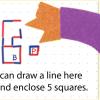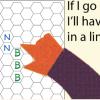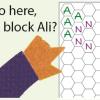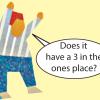Search Results
Showing results 1 to 8 of 8
I Spy Shapes
Source Institutions
The learner will ask yes-no questions to identify a secret shape (similar to Twenty Questions). Build understanding of shapes and logic skills with this game for all ages.
Size Them Up: Learning About Volume and Capacity
Source Institutions
In this activity, learners will put a set of containers in order by capacity. Would the tallest container hold more or less water than the wide, short one?
Narrow It Down: Asking Yes-No Questions
Source Institutions
In this activity, the learner asks yes-no questions to identify a secret object (similar to Twenty Questions). This game is easy to adapt for different ages and different kinds of contexts.

Close It Up
Source Institutions
As learners play this challenging strategy game, they build understanding of area and perimeter. On each turn, a player draws a line between two dots next to each other on the grid.

Four in a Line
Source Institutions
This strategy game has simple rules but can be a challenge. Players start with an empty hexagonal grid. On each turn, a player initials one empty hexagon on the grid.

Touch and Go
Source Institutions
As learners play this game, they develop logic, geometry, and spatial visualization skills. Players start out with an empty hexagonal grid.
Narrow it Down: Numbers
Source Institutions
In this activity, learners will ask yes-no questions to identify a secret number (similar to Twenty Questions). Combine logic and numbers in this game for all ages.

Mystery Number
Source Institutions
Combine logic and numbers in this game for all ages. Players start with a 10x10 grid of the numbers 1 to 100. One person chooses a secret number and announces the range in which it falls.
